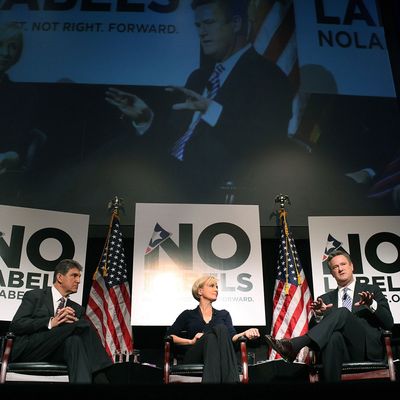
Political Centrists come in various forms. There are plenty of Democratic Centrists who may differ from their lefty brethren on all sorts of issues, but not their allegiance to the Democratic Party. Think Bill Clinton, Tim Kaine, Amy Klobuchar, Pete Buttigieg, and Joe Biden (some put every Democratic presidential nominee from 1980 to 2020 in the Centrist tribe). There are Republican Centrists too, though they have been RINO-hunted into near extinction lately; Lisa Murkowski, Susan Collins, Phil Scott, and Larry Hogan are the last remnants of this once robust brand.
Beyond these loose groups are independent Centrists. These folks believe there is a huge constituency outside the two major parties and fantasize about a Centrist third party mobilizing this hidden majority to win major elections. Today’s most visible independent Centrist organization is No Labels; the group offers some of the more independent Centrists in both parties a platform for cooing at each other while distancing themselves from “the extremes,” and occasionally threatens a full-on third-party effort (No Labels is the sponsor, for example, of the bipartisan Problem Solvers’ Caucus in Congress). With partisan and ideological polarization at historic heights right now, these are bracing days for No Labels and other independent Centrists, who think of themselves as having a greater potential following than ever.
No Labels recently started organizing a formal 2024 third-party presidential bid, as inveterate independent Centrist (and formerly a Republican Centrist) David Brooks happily reported last fall:
What happens if the Republicans nominate someone who is morally unacceptable to millions of Americans while the Democrats nominate someone who is ideologically unacceptable? …
The group No Labels has been working quietly over the past 10 months to give Americans a third viable option. The group calls its work an insurance policy. If one of the parties nominates a candidate acceptable to the center of the electorate, then the presidential operation will shut down. But if both parties go to the extremes, then there will be a unity ticket appealing to both Democrats and Republicans to combat this period of polarized dysfunction.
The No Labels operation is a $70 million effort, of which $46 million has already been raised or pledged.
In the intervening months it has become pretty clear that Democrats will renominate Centrist Democrat Joe Biden next year, making an “insurance policy” unnecessary, even though Republicans will probably go with a loud-and-proud MAGA conservative. But now the Centrist Democratic organization Third Way has issued a warning, via a memo published by Politico, that No Labels seems to be moving ahead with its third-party contingency plans — and that move might actually help Donald Trump or some other dangerous Republican nominee.
Third Way notes that despite all the “insurance policy” rhetoric, No Labels is “on the ground seeking spots on the ballot in multiple states, including battlegrounds like Arizona, Florida, North Carolina, and Nevada, and claim they will compete in at least 23.” It is also planning to hold a presidential nominating convention in Dallas on April 23, 2024. Things are pretty far along for them to be dismissed as a mere emergency contingency plan. Third Way fears that No Labels will lump Biden together with Trump or DeSantis, dismissing both major party nominees as too extreme, and move right ahead with a third-party scheme. As the group explains, that effort is significantly more likely to hurt Democrats rather than Republicans:
• 2016 third-party voters went for Biden in 2020: According to AP Votecast, Biden won voters who had backed Jill Stein and Gary Johnson by 30 points. Such voters could peel away to the No Labels candidate in 2024 and hand victory to Trump.
• “Double haters” went for Biden: Voters who do not like either major-party candidate would tend to back Democrats in a forced choice. Biden won “double haters” in 2020 by 15 points. (Clinton lost those voters by 17 points in 2016.) Giving them a third-party choice clearly helps the GOP.
• Biden is more vulnerable in close states: In 2020, Biden won six of the seven states where the margin was three points or less. Even a paltry third-party performance would put 79 Biden electoral votes at risk (GA, AZ, WI, PA, NV, and MI).
• No Labels is targeting blue states: The No Labels map gives away the game: They project to win 2/3 of their electoral votes in states that Biden won in 2020. So, by their own admission, their prime targets are voters who would otherwise back the Democrat.
Perhaps self-styled “Centrists” who are reflexively sympathetic to No Labels, including Democratic politicians who show up at their events to prove how reasonable they are, will listen to this warning since it’s coming from folks who aren’t exactly socialists or even progressives. No Labels needs to wake up and take stock of the very real threat of extremism emanating from a presidential election it cannot win but could very easily spoil.
More on politics
- Trump Is Threatening to Invade Panama, Take Back Canal
- Everyone Biden Has Granted Presidential Pardons and Commutations
- What Happened to Texas Congresswoman Kay Granger?






























